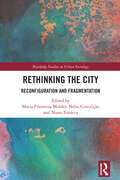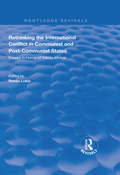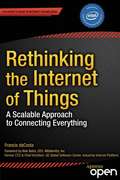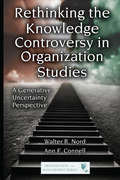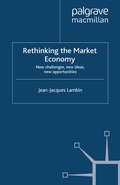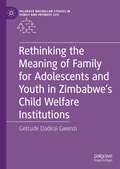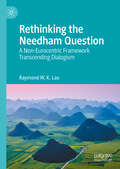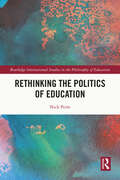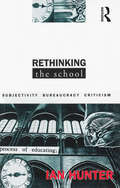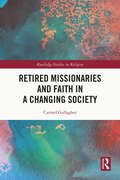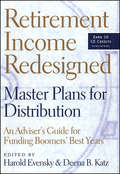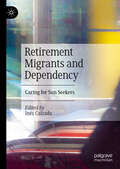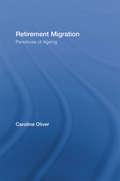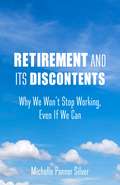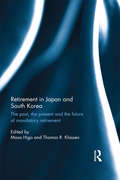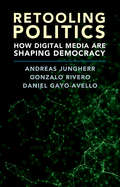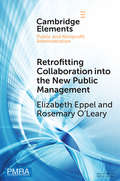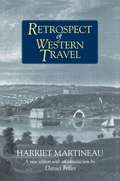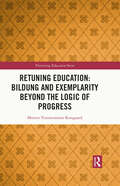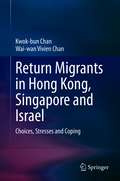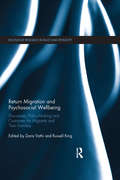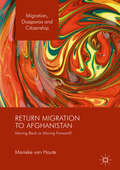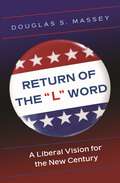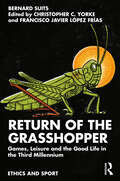- Table View
- List View
Rethinking the City: Reconfiguration and Fragmentation (Routledge Studies in Urban Sociology)
by Maria Filomena Molder Nélio Conceição Nuno FonsecaInterdisciplinary in approach, this book employs the key concepts of fragmentation and reconfiguration to consider the ways in which human experience and artistic practice can engage with and respond to the disintegration that characterises modern cities. Asking how we might unsettle and decrypt the homogeneous images of cities created by processes linked to capitalism and globalisation, it invites us to consider the possibility of reimagining and rethinking the urban spaces we inhabit.An exploration of the complex relationship between aesthetics, the arts and the city, Rethinking the City: Reconfiguration and Fragmentation will appeal to scholars across various disciplines, including philosophy, urban sociology and geography, anthropology, political theory and visual and media studies.
Rethinking the Corporation: The Architecture of Change
by Robert M. TomaskoA blueprint for examining how and why to make fundamental changes in the corporate structure that will have a lasting impact.
Rethinking the International Conflict in Communist and Post-communist States: Essays in Honour of Miklos Molnar (Routledge Revivals)
by Renéo LukicFirst published in 1998, the essays in this book cover a wide range of subjects related to Soviet/Russian politics and to political developments in Southeastern Europe since 1989. The first three chapters focus on Soviet/Russian foreign and domestic policy before and after the end of the Cold War. The next three chapters concentrate on the disintegration of Yugoslavia and its aftermath. The final chapter covers political developments in the Federal Republic of Yugoslavia up to the present day. The contributors to this book were all former students of Professor Miklós Molnár, and they are all now prominent researchers in the field of international relations.
Rethinking the Internet of Things: A Scalable Approach to Connecting Everything
by Francis DacostaApress is proud to announce that Rethinking the Internet of Things was a 2014 Jolt Award Finalist, the highest honor for a programming book. And the amazing part is that there is no code in the book. Over the next decade, most devices connected to the Internet will not be used by people in the familiar way that personal computers, tablets and smart phones are. Billions of interconnected devices will be monitoring the environment, transportation systems, factories, farms, forests, utilities, soil and weather conditions, oceans and resources. Many of these sensors and actuators will be networked into autonomous sets, with much of the information being exchanged machine-to-machine directly and without human involvement. Machine-to-machine communications are typically terse. Most sensors and actuators will report or act upon small pieces of information - "chirps". Burdening these devices with current network protocol stacks is inefficient, unnecessary and unduly increases their cost of ownership. This must change. The architecture of the Internet of Things must evolve now by incorporating simpler protocols toward at the edges of the network, or remain forever inefficient. Rethinking the Internet of Things describes reasons why we must rethink current approaches to the Internet of Things. Appropriate architectures that will coexist with existing networking protocols are described in detail. An architecture comprised of integrator functions, propagator nodes, and end devices, along with their interactions, is explored. What you''ll learn Discusses the difference between the "normal" Internet and the Internet of Things. Describes a new architecture and its components in the "chirp" context. Explains the shortcomings of IP for IoT. Describes the anatomy of the IoT. Describes how to build a suitable network to maximize the amazing potential of the IoT. Who this book is for Thought leaders, executives, architectural, standards and development leaders in the evolving IoT industry. Corporations and organizations whose commercial products could be adapted simply to be functioning devices on the IOT while saving billions of dollars in unnecessary costs or proprietary designs. Those who wish to capitalize on technology change and those interested in the Internet, its capabilities and the need to improve it. Table of Contents Foreword Preface Chapter Goal: The reader will understand the new demands and opportunities of the Internet of Things (IoT). The preface introduces the idea of a new, simplified architectural approach that draws on nature. Chapter 1: It''s Different Out Here Chapter Goal: Reader should understand the difference between traditional Internet networking and the Internet of Things. What are the unique characteristics of the IoT that demand a new architecture? Why traditional architectures such as IP are a poor fit. Characteristics of an IoT-optimized architecture. Chapter 2: Anatomy of the Internet of Things Chapter Goal: Reader will understand the underlying principles of the emerging IoT architecture. Fundamental concepts are: the division of networking complexity among different devices; the make-up of the "Chirp" and how they are propagated; distinctions between transport and functional topologies; the concept of neighborhoods or zones of interest. Chapter 3: On the Edge Chapter Goal: Reader will learn the principles and characteristics of the End Devices in the IoT and how these will often differ from our present understanding of the Smartphone, tablet, and laptop. How the minimal networking needs of many IoT devices dictate elements of the architecture. Chapter 4: Building a Web of Things Chapter Goal: Reader will learn the characteristics and functionality of the Propagator node in the IoT Architecture. Some communications principles are introduced which will be more fully explored in Chapter 6. Chapter 5: Small Data, Big Data, and Human Interaction Chapter Goal: Reader will understand the role of Integrator functions in the IoT, the point in the IoT where humans interact to ...
Rethinking the Knowledge Controversy in Organization Studies: A Generative Uncertainty Perspective (Organization and Management Series)
by Walter R. Nord Ann F. ConnellRecently the field of organization studies has been plagued by intense, disruptive controversy about what counts as knowledge. This book, written by the major researchers and voices in the field of organization studies, attempts to respond to this controversy by offering the topic of "generative uncertainty" as the primary vehicle for rethinking about this issue. The authors prefer admitting uncertainty to making unwarranted assumptions. The ideas about questioning the possibility of knowledge that is certain goes back to before the time of Socrates. This unique, historical look at the study of organization studies will be of interest to all students and scholars of this field.
Rethinking the Market Economy: New Challenges, New Ideas, New Opportunities
by J. LambinThis book explores the changing socio-economic and technological landscape of the 21 century and what it means. It adopts an industrial economic approach, whilst proposing a road map leading to the adoption of a 'societal market economy' model as an appealing and politically acceptable third-way between capitalism and socialism.
Rethinking the Meaning of Family for Adolescents and Youth in Zimbabwe’s Child Welfare Institutions (Palgrave Macmillan Studies in Family and Intimate Life)
by Getrude Dadirai GwenziThis book examines the lives of children and young adults living in residential care systems in Zimbabwe and their unique conceptualization of family. While the importance of family for the development and wellbeing of children can't be overemphasized, the questions of what and who counts as family to orphans and vulnerable children (OVCs) are under-researched. Gwenzi brings a social constructionist approach to study OVCs in institutional care as well as living with their families in Zimbabwe, finding that they do not have a single definition of family and that they use diverse characteristics to describe what family means to them. With the data suggesting a need for belonging, continuity of relationships, protection, and trust, this study makes recommendations for policy and practice with youth in alternative care in sub-Saharan Africa.
Rethinking the Needham Question: A Non-Eurocentric Framework Transcending Dialogism
by Raymond W. LauThis book offers a new investigation of the Needham Question. Why did modern science emerge in Europe, but not in any of the advanced non-European civilizations? Eurocentric accounts attribute it to certain ‘qualities’ said to be ‘unique’ to Europe. Opposed to the Eurocentric view is a position known as the ‘dialogical perspective’. Dialogism argues that Europe borrowed heavily from non-European scientific knowledges, and that scientific exchanges were key to the development of modern science. Neo-Eurocentric arguments have emerged in response to the challenge of dialogism, and the debate between Eurocentrism/neo-Eurocentrism and dialogism currently stands at a stalemate. In this book, Raymond Lau brings a new theoretical-methodological framework to finally settle this debate. The historical analysis developed here shows that to secure the non-Eurocentric case, and decisively rebut Eurocentrism and neo-Eurocentrism, it is necessary to go beyond dialogism both theoretically and methodologically.
Rethinking the Politics of Education (Routledge International Studies in the Philosophy of Education)
by Nick PeimRethinking the Politics of Education provides an entirely original rethinking of the modern and contemporary mythology of education. Problematizing the ideas concerning education as fulfilment and redemption, the book critically reviews the association of education with projects of social justice, democracy and improvement. This book argues for a fundamental rethinking of what education is, exploring how things stand with education and educational apparatuses in the contemporary world. It examines relations between educational discourses and their implied ontological stances and offers new ways of thinking that draw on ontological positions from psychoanalytical, philosophical and social discourses. The book contends that education is an essential form of politics and must be understood through a careful examination of its history modes of operation and its basic structures, rather than an idealized version of what it might be. Presenting an original and alternative account of a theoretically informed political ontology of education, the book will be of great interest to academics, researchers and postgraduate students interested in the philosophy of education, the politics of education, educational theory and the sociology of education.
Rethinking the School: Subjectivity, bureaucracy, criticism
by Ian HunterEducationalists have long worked to democratise our school system and purge traces of its religious origins. Rethinking the School shows that these efforts have been in vain. The bureaucratic organisation of schooling is here to stay, and Christian moral discipline is an integral part of the school as we know it.Hunter argues that both liberal and Marxian theory ignore the historical reality of the school. He does not see the school as the failed attempt to realise principles of social equality, complete personal development and intellectual enlightenment. Rather, he sees the modern school as an improvised apparatus for the training of good citizens and the guidance of souls.Rethinking the School is one of the first major applications of Foucault's genealogical method to the school system, and will be widely debated by educationalists, policy-makers and those interested in the interaction of government and subjectivity.'This is a serious piece of scholarship which breaks with much orthodoxy in educational theory and research. It brings new insights to old dilemmas and as such is a major contribution to a field which has in some respects lost its nerve. This is a book that must be read.' - Professor Richard Smith, Australian Journal of Education'Hunter. offers a detailed and fascinating account of the popular school. in a manner which reinvigorates modern debates regarding the relations between government and education. He makes us look and see differently, the hallmark of a powerful and original thinker.' - Professor Tony Bennett, Institute for Cultural Policy Studies
Retired Missionaries and Faith in a Changing Society (Routledge Studies in Religion)
by Carmel GallagherRetired Missionaries and Faith in a Changing Society offers a sociological study of the Irish missionary diaspora. It draws on a series of interviews with female and male Catholic missionaries, mainly nuns and priests, who have worked in Asia, Africa and Central and South America, and who have returned to live in Ireland. The chapters provide unique insight into their experiences, exploring how they have navigated life-course changes in the context of changing church and changing societies. Retired missionaries have several vantage points from which to communicate their understandings, having worked across cultures and encountered some of the most challenging global social problems. Responding to significant changes in the Catholic Church, in Irish society, in their host countries and in mission work itself, their lives offer valuable perspectives on what it is to be Christian in contemporary society. The rich narrative data illuminates deep and complex processes of meaning-making as missionaries have sought to integrate their religion and spirituality in dynamic and diverse settings. The book suggests that the holistic character of the work of missionaries raises important questions about the different ways of being ethical, religious and acting justly in the world today. It will be of particular interest to scholars of Christianity, missiology, and the sociology of religion.
Retirement Income Redesigned: Master Plans for Distribution -- An Adviser's Guide for Funding Boomers' Best Years
by Walter Updegrave Katz Harold Evensky Deena B.Clients nearing retirement have some significant challenges to face. And so do their advisers. They can expect to live far longer after they retire. And the problems they expect their advisers to solve are far more complex. The traditional sources of retirement income may be shriveling, but boomers don't intend to downsize their plans. Instead, they're redefining what it means to be retired--as well as what they require of financial advisers. Planners who aren't prepared will be left behind. Those who are will step up to some lucrative and challenging work. To help get the work done, Harold Evensky and Deena Katz--both veteran problem solvers--have tapped the talents of a range of experts whose breakthrough thinking offers solutions to even the thorniest issues in retirement-income planning: Sustainable withdrawals Longevity risk Eliminating luck as a factor in planning Immediate annuities, reverse mortgages, and viatical and life settlements Strategies for increasing retirement cash flow In Retirement Income Redesigned, the most-respected names in the industry discuss these issues and a range of others.
Retirement Migrants and Dependency: Caring for Sun Seekers
by Inés CalzadaThis book tells the story of what happens when the “adventure” of living in Spain turns complicated due to the emergence of care needs derived from loss of autonomy. It investigates the care strategies of retirement migrants that must navigate a foreign welfare system and a different “culture of care”, and how the COVID-19 pandemic exacerbated the difficulties they experience accessing care services and information. The book condenses the results of a 4-year (2019-2022) research project funded by the Spanish Ministry of Science under the title “Retirement migration and the Social Services” and applies a mixed methods approach that combined statistical analysis of secondary data; telephonic interviews with the coordinators of Social Services in more than 80 Spanish municipalities with a high presence of retirement migrants; ethnographic case studies in four municipalities (observation, interviews, focus groups); and an online survey with social workers.
Retirement Migration: Paradoxes of Ageing (Routledge Research in Population and Migration)
by Caroline OliverThe book is the first ethnographic study of international retirement migration and offers a sometimes surprising picture of the potentials, seductions and limitations of the lifestyles. People envision retirement as freedom from responsibilities through shedding the restrictive shackles of their former selves in a time of life dedicated to fun, friendship, healthy activity and individual fulfillment. However, as Oliver documents, a number of contradictions underpin the pursuits of such a lifestyle. She shows how retirees must balance time-use to achieve both freedoms and busy social schedules -- their activities, their relationships, and their cultural identities – to balance both the security of nationality with the discovery of the new. Retirement Migration gives a critical insight into the new ways aging identities are experienced by a growing number of older people in Western societies today.
Retirement and Its Discontents: Why We Won't Stop Working, Even If We Can
by Michelle Pannor SilverIn the popular imagination, retirement promises a well-deserved rest—idle days spent traveling, volunteering, pursuing hobbies, or just puttering around the house. But as the nature of work has changed, becoming not just a means of income but a major source of personal identity, many accomplished professionals struggle with discontentment in their retirement. What are we to do—individually and as a culture—when work and life experience make conventional retirement a burden rather than a reprieve?In Retirement and Its Discontents, Michelle Pannor Silver considers how we confront the mismatch between idealized and actual retirement. She follows doctors, CEOs, elite athletes, professors, and homemakers during their transition to retirement as they struggle to recalibrate their sense of purpose and self-worth. The work ethic and passion that helped these retirees succeed can make giving in to retirement more difficult, as they confront newfound leisure time with uncertainty and guilt. Drawing on in-depth interviews that capture a range of perceptions and common concerns about what it means to be retired, Silver emphasizes the significance of creating new retirement strategies that support social connectedness and personal fulfillment while countering ageist stereotypes about productivity and employment. A richly detailed and deeply personal exploration of the challenges faced by accomplished retirees, Retirement and Its Discontents demonstrates the importance of personal identity in forging sustainable social norms around retirement and helps us to rethink some of the new challenges for aging societies.
Retirement in Japan and South Korea: The past, the present and the future of mandatory retirement
by Thomas R. Klassen Masa HigoThis book analyses reforms to retirement policies in Japan and South Korea, especially in the context of rapid population ageing. A defining feature of the labour markets and workplaces in these two nations, and the lives of workers and families, is involuntary retirement at relatively young ages. The book explains past developments and recent reforms of retirement policies both in the two countries, as well as in a cross-national comparative manner. At the core of the book is an examination of the social, economic and political conflicts around retirement, such as between younger and older workers, between employers and governments, and between employers and workers. The policy recommendations offered apply not only to Japan and South Korea, but also to other nations such as China. The volume is of value particularly for those interested in labour markets and workplaces, population ageing and contemporary East Asia, in addition to those studying retirement and pensions. Policymakers, business leaders, worker organizations, researchers and students will benefit from the insights about the past, present and future of retirement.
Retooling Politics: How Digital Media Are Shaping Democracy
by Andreas Jungherr Gonzalo Rivero Daniel Gayo-AvelloDonald Trump, the Arab Spring, Brexit: digital media have provided political actors and citizens with new tools to engage in politics. These tools are now routinely used by activists, candidates, non-governmental organizations, and parties to inform, mobilize, and persuade people. But what are the effects of this retooling of politics? Do digital media empower the powerless or are they breaking democracy? Have these new tools and practices fundamentally changed politics or is their impact just a matter of degree? This clear-eyed guide steps back from hyperbolic hopes and fears to offer a balanced account of what aspects of politics are being shaped by digital media and what remains unchanged. The authors discuss data-driven politics, the flow and reach of political information, the effects of communication interventions through digital tools, their use by citizens in coordinating political action, and what their impact is on political organizations and on democracy at large.
Retrofitting Collaboration into the New Public Management: Evidence from New Zealand (Elements in Public and Nonprofit Administration)
by Rosemary O'Leary Elizabeth EppelThis Element is about the challenges of working collaboratively in and with governments in countries with a strong New Public Management (NPM) influence. As the evidence from New Zealand analyzed in this study demonstrates, collaboration – working across organization boundaries and with the public – was not inherently a part of the NPM and was often discouraged or ignored. When the need for collaborative public management approaches became obvious, efforts centered around “retrofitting” collaboration into the NPM, with mixed results. This Element analyzes the impediments and catalysts to collaboration in strong NPM governments and concludes that significant modification of the standard NPM operational model is needed including: Alternative institutions for funding, design, delivery, monitoring and accountability; New performance indicators; Incentives and rewards for collaboration; Training public servants in collaboration; Collaboration champions, guardians, complexity translators, and stewards; and paradoxically, NPM governance processes designed to make collaborative decisions stick.
Retrospect of Western Travel
by Harriet Martineau"This new abridgement of the original 1838 edition offers a view of Jacksonian America. Here are Martineau's condemnation of slavery and her championship of abolition and women's rights; her incisive portraits of Jackson, Clay, Calhoun, Webster, Garrison, Emerson, and the Beechers; her observations of American schools, asylums, colleges, and prisons; and her eyewitness accounts of a presidential assassination attempt, a lynch mob, a slave auction, a Quaker wedding, and a Harvard commencement. Historian Daniel Feller, author of The Jacksonian Promise, introduces the narrative, identifies the major characters, and provides an index for easy use. "--BOOK JACKET. Title Summary field provided by Blackwell North America, Inc. All Rights Reserved
Retuning Education: Bildung and Exemplarity Beyond the Logic of Progress (ISSN)
by Morten Timmermann KorsgaardThis book responds to the need for new ways of defining the aims and forms of education, in an age that has seen the ideals of progress and growth lead the planet and its inhabitants to the brink of extinction.Arguing that contemporary ideas of performance and accountability counter "the heart" of education, the book calls for a retuning of education that encourages the younger generation to study objects and ideas for their own sake, rather than to appease established and conventional notions in society – therefore stepping into a common space of reflection and study. The chapters examine why and how we educate, and offer the alternative of engaging with educational questions, not determined by the logic of progress and growth but with an objective of creating a relation to the world around us. Using the works of Hannah Arendt combined with the tradition of Allgemeine Pädagogik to argue for a new conception of Bildung, the book encourages a method that emphasises outrospection over introspection.Ultimately questioning modern-day education, the book redirects and retunes education away from being wholly concerned with achievement and growth, and will therefore be of interest to students, researchers and academics in the fields of philosophy of education, education and curriculum studies, education policy and politics, and sociology of education.
Return Migrants in Hong Kong, Singapore and Israel: Choices, Stresses and Coping
by Kwok-bun Chan Wai-wan Vivien ChanThis insightful volume explores the experiences of ethnic migrants returning to Hong Kong, Singapore, and Israel. Return migrants who were exposed to the western culture and society undergo personal transformations that significantly impact their views on values such as gender, individualism, democracy, tradition, and individual autonomy. To evaluate how well these individuals are able to reintegrate back into their native countries, the authors conducted a thorough comparative study between returnees in the three research sites through in-depth interviews, ethnographic fieldwork, and analyses of government policies. Among the topics discussed: Family as a strategic middle ground between the individual and societyThe social psychology of coping and adaptationPublic, outer historical, and macro forces that shape returnees’ experiences Comparisons and contrasts between two primarily Chinese societies, along with one racially and culturally different Western society Cost-and-benefit analyses of decision-making in migration Return Migrants in Hong Kong, Singapore, and Israel is a compelling new perspective on the migrant experience drawn from in-depth research on returnees across three countries and a variety of circumstances.
Return Migration and Psychosocial Wellbeing: Discourses, Policy-Making and Outcomes for Migrants and their Families (Routledge Research in Race and Ethnicity)
by Russell King Zana VathiReturn migration is a topic of growing interest among academics and policy makers. Nonetheless, issues of psychosocial wellbeing are rarely discussed in its context. Return Migration and Psychosocial Wellbeing problematises the widely-held assumption that return to the country of origin, especially in the context of voluntary migrations, is a psychologically safe process. By exploding the forced-voluntary dichotomy, it analyses the continuum of experiences of return and the effect of time, the factors that affect the return process and associated mobilities, and their multiple links with returned migrants' wellbeing or psychosocial issues. Drawing research encompassing four different continents – Europe, North America, Africa and Asia – to offer a blend of studies, this timely volume contrasts with previous research which is heavily informed by clinical approaches and concepts, as the contributions in this book come from various disciplinary approaches such as sociology, geography, psychology, politics and anthropology. Indeed, this title will appeal to academics, NGOs and policy-makers working on migration and psychosocial wellbeing; and undergraduate and postgraduate students who are interested in the fields of migration, social policy, ethnicity studies, health studies, human geography, sociology and anthropology.
Return Migration to Afghanistan: Moving Back or Moving Forward? (Migration, Diasporas and Citizenship)
by Marieke van HouteThis book overcomes the dichotomies, generalizations and empirical shortcomings that surround the understanding of return migration within the migration–development–peace-building nexus. Using the concept of multidimensional embeddedness, it provides an encompassing view of returnees’ identification with and participation in one or multiple spaces of belonging. It introduces Afghan return migration from Europe as a relevant case study, since the country’s protracted history of conflict and migration shows how the globally changing political discourses of recent decades have shaped migration strategies. The author’s findings highlight the fact that policy is responding inadequately to complex issues of migration, conflict, development and return, since the expectations on which it is based only account for a small minority of returnees. This thought-provoking book will appeal to scholars of migration and refugee studies, as well as a wider audience of sociologists, anthropologists, demographers and policy makers.
Return of the "L" Word: A Liberal Vision for the New Century
by Douglas S. MasseySomewhere in the 1970s liberals in the United States lost their way. After successes like the New Deal, they became arrogant. So argues Douglas Massey in Return of the "L" Word. Faced with the difficult politics of race and class, liberals used the heavy hand of government to impose policies on a resentful public. Conservatives capitalized on this with a staunch ideology of free markets, limited government, and conservative social values. The time is ripe for a liberal realignment, declares Massey, but what has been lacking is a consistent liberal ideology that explains to voters, in simple terms, government's vital role in producing a healthier, more financially equitable, less divided society. This book supplies that ideology. Massey begins his powerful manifesto by laying out the liberals' mistakes over the past twenty years. Drawing on insights from the expanding field of economic sociology, he then sets forth a clear set of liberal principles to explain how markets work in society, principles he applies to articulate salable liberal policies. After outlining a new liberal political philosophy, Massey traces liberalism's opposition and says plainly: liberals should have no illusions about the competition's resolve and skill. He closes with a practical approach to liberal coalition-building in America. The political economy conservatives have constructed in recent decades has benefited 20 percent of the people. Liberal success requires a return to material rather than symbolic politics, showing most Americans why it is in their economic as well as moral interest to support the liberal cause.
Return of the Grasshopper: Games, Leisure and the Good Life in the Third Millennium (Ethics and Sport)
by Bernard SuitsIn this sequel to Bernard Suits’ timeless classic philosophical work The Grasshopper: Games, Life and Utopia, published in its full and unabridged form for the first time, Suits continues to explore some of our most fundamental philosophical questions, including the value of sport and games, and their relationship to the good life. In Return of the Grasshopper, Suits puts his theoretical cards on the table, exploring the in-depth implications of his definition of utopia, assessing the merits of a gamified philosophy, and explaining how games can provide an existential balm against the fear of death. Perhaps most importantly, for the first time in print, Suits reveals his underlying worldview: that humanity is forever fated to endure a cyclical existence of privation, brought on by material scarcity, and boredom, resulting from material plenitude. An essential companion to The Grasshopper, this edition includes an introductory chapter that puts Suits’ life and work into context, helping the reader to understand why Suits has had such a profound influence on contemporary philosophy and how his ideas still provide powerful insight into the human condition. This book is important reading for anybody with an interest in the philosophy of sport, leisure and play, political philosophy, ethics, existentialism or utopian studies.
